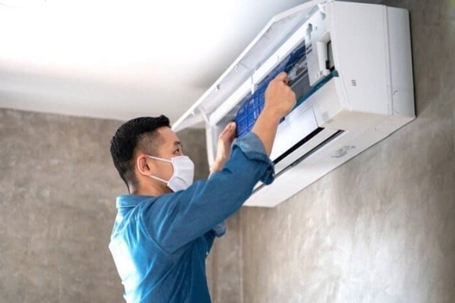Maintaining a comfortable environment is essential for any business. This is particularly true in commercial facilities, where the air conditioning system is crucial. A well-functioning air conditioning (AC) system helps keep the indoor climate pleasant, enhances productivity, and creates a welcoming atmosphere for customers. This guide will explore the importance of commercial AC maintenance and provide strategies for ensuring optimal performance.
The Importance of Commercial AC Maintenance
The AC system operates constantly in many commercial environments, making regular maintenance indispensable. Proper maintenance helps avoid unexpected breakdowns and prolongs the life of the equipment. It also ensures energy efficiency, leading to lower utility costs, and maintains indoor air quality, which is crucial for the health and comfort of employees and customers alike.
Regular AC maintenance is a proactive approach that can save businesses significant costs in the long run. With the support of reputable service providers such as Momentum AC & Electric, companies can implement effective strategies for commercial AC maintenance.
Key Differences Between Residential and Commercial AC Systems
Understanding how commercial AC systems differ from residential units is essential for business owners and facility managers.
Understanding Commercial AC Systems
Commercial AC systems are designed to handle larger spaces with higher occupancy. They are often more complex and may have different cooling and heating requirements than residential systems.
Types of Commercial AC Systems: Overview
- Split Systems: Often used for smaller businesses, split systems consist of an outdoor condenser and an indoor unit.
- Variable Refrigerant Flow (VRF) Systems: These systems, suitable for more significant buildings, use a refrigerant as a heat transfer medium and provide efficient zoning capabilities.
- Packaged Units: Designed for larger spaces like schools or factories, packaged units house all components in one outdoor unit, simplifying installation and maintenance.
- Central AC Systems: Typically used in large commercial buildings, these systems involve extensive ductwork and centralized cooling systems.
Components of a Commercial AC Unit
Regardless of the type, commercial AC systems share standard components, including:
- Compressors: Essential for circulating refrigerant and facilitating heat exchange.
- Evaporator Coils: Cool down the air inside by absorbing heat.
- Condenser Coils: Release absorbed heat to the outside environment.
- Air Filters: Clean the air circulating through the system.
- Ductwork: Delivers conditioned air to various spaces within the facility.
How Commercial AC Systems Differ from Residential Systems
- Size and Capacity: Commercial systems have larger cooling capacities to serve larger spaces.
- Complexity: Commercial units often require more intricate setups, with features like zoning and more advanced control systems.
- Usage Patterns: Commercial AC units may run for longer hours and endure higher usage peaks than residential units.
The Benefits of Regular AC Maintenance for Businesses
Regular maintenance of commercial AC systems expedites numerous benefits that support the smooth operation of a business.
Enhanced Efficiency and Performance
Routine checks ensure the AC system operates at peak efficiency. Well-maintained systems consume less energy, leading to lower utility costs. Regular filter changes, coil cleanings, and system inspections keep equipment working efficiently.
Reduced Risk of Unexpected Breakdowns
Scheduled preventative maintenance can identify potential issues before they escalate into major problems. By catching these concerns early, businesses minimize the chances of unexpected system failures during peak usage periods.
Improved Air Quality and Comfort for Employees and Customers
Indoor air quality is crucial for a healthy work environment. Regular maintenance includes checking filters and cleaning ducts, which helps reduce allergens and pollutants circulating in the air. Improved air quality contributes to enhanced employee productivity and comfort.
Essential Maintenance Tasks for Commercial AC Units
Maintaining commercial AC systems involves various tasks and checks that should be performed regularly to ensure optimal performance.
Monthly Maintenance Checklist
- Inspecting and Replacing Air Filters: Filters should be checked monthly and replaced when dirty to maintain airflow.
- Checking Thermostat Settings: Ensure that thermostat settings match the desired temperature.
- Observing System Performance: Listen for unusual sounds or changes in cooling efficiency, noting any irregularities that may require attention.
Quarterly Maintenance Checklist
- Cleaning Coils and Condensate Drains: Dirty coils reduce efficiency; cleaning them regularly is vital. Additionally, clearing condensate drains prevents water problems.
- Checking Refrigerant Levels: Ensure the refrigerant levels are optimal for efficient cooling.
- Inspecting Electrical Connections: Inspect all electrical components for secure connections and corrosion.
Annual Maintenance Checklist
- Comprehensive System Inspection: A certified HVAC technician thoroughly examines all components.
- Testing and Calibration of Components: Ensure all components are calibrated and functioning correctly.
- Cleaning and Lubricating Moving Parts: This ensures smooth operation and longevity of the system.
Creating a Maintenance Schedule
Importance of a Regular Maintenance Schedule
A regular maintenance schedule ensures that your commercial AC system operates efficiently and effectively. Neglecting maintenance can lead to reduced performance and increased costs due to repairs and energy bills.
How to Set Up a Maintenance Calendar
- Identify Key Dates: Align your inspections with the changing seasons – before the summer and winter peaks.
- Hire a Professional Service: Utilize an HVAC service provider such as Momentum AC & Electric to help manage the maintenance calendar.
- Track Completed Tasks: Maintain a log of completed maintenance tasks to ensure nothing is overlooked.
Tips for Keeping Track of Maintenance Tasks
- Use digital calendars or facility management software to remind you of scheduled tasks.
- Consider contracts with HVAC service providers to ensure consistent attention to your systems.
Professional AC Maintenance Services
What to Expect from a Professional AC Service
Professional HVAC services include thorough inspections, cleaning, troubleshooting, and repairs. Technicians will check all major components to ensure optimal performance.
Benefits of Hiring a Certified HVAC Technician
Hiring certified technicians ensures that maintenance tasks are performed accurately and efficiently. Experienced professionals can quickly identify issues and make informed recommendations for repairs or upgrades.
How to Choose the Right HVAC Service Provider
Look for companies with solid reputations, positive customer reviews, and relevant certifications. Ask for recommendations and check their experience with commercial AC systems.
Troubleshooting Common Commercial AC Issues
Despite regular maintenance, issues may still arise in commercial AC systems. Understanding common problems and fixes can help you react quickly and effectively.
AC Not Cooling Properly: Diagnosis and Solutions
If your system is not chilling adequately, check the following:
- Filters: Are they clogged?
- Refrigerant Levels: Are they low?
- Thermostat Settings: Is it set correctly?
Unusual Noises: What They Indicate
Strange noises can indicate several problems:
- Rattling: Loose components may need attention.
- Hissing: I might suggest a refrigerant leak.
Leaking Water: Causes and Remedies
Water leakage can be caused by:
- Blocked drainage lines.
- Improperly insulated ducts.
Energy Efficiency and Commercial AC Maintenance
How Regular Maintenance Enhances Energy Efficiency
Regular maintenance is essential for maintaining optimal energy efficiency. Businesses can ensure their systems run efficiently by scheduling periodic cleanings and replacements.
Tips for Reducing Energy Consumption
- Use programmable thermostats to regulate temperature based on occupancy.
- Seal leaks in ducts to prevent air loss.
Understanding Energy Efficiency Ratings
Learning about SEER (Seasonal Energy Efficiency Ratio) ratings when considering energy-efficient systems. Higher ratings typically mean better efficiency and lower bills.
Environmental Considerations
Managing Refrigerant Leaks
Refrigerant leaks can significantly harm the environment. Ensure your AC maintenance plan includes checks for leaks and proper refrigerant handling.
Eco-Friendly Maintenance Practices
Opt for environmentally friendly practices, such as using non-toxic cleaning solutions and responsibly disposing of old AC units.
AC Maintenance for Different Types of Commercial Buildings
Office Buildings
- Consider the number of employees and their comfort levels.
Retail Stores
- Create an inviting shopping atmosphere with optimal temperatures.
Industrial Facilities
- Ensure that HVAC systems can handle heavy machinery and heightened heat.
Healthcare Facilities
- Prioritize air purification and optimal temperature control to keep patients safe and comfortable.
Implementing Preventative Measures
The Role of Preventive Maintenance in Reducing Costs
Regular maintenance can significantly mitigate unforeseen repair expenses while extending the HVAC system’s lifespan.
Upgrades and Modernizations to Improve System Reliability
Consider implementing upgrades to integrate innovative technology or energy-efficient systems to optimize operational performance.
Emergency Maintenance and Repairs
When to Schedule Emergency Repairs
Establish clear indicators for when emergency maintenance is needed to avoid long downtimes.
Developing an Emergency Maintenance Plan
Have a structured plan, including emergency contacts and immediate response actions for HVAC failures.
Finding Reliable Emergency Repair Services
Ensure you have contacts for reliable service technicians. Look for providers who offer 24/7 service, such as Momentum AC & Electric.
The Role of Building Management Systems (BMS)
Integration of AC Maintenance with BMS
Utilizing a Building Management System can streamline the maintenance process, allowing for real-time monitoring and control of your HVAC systems.
Benefits of Monitoring and Controlling AC Systems Remotely
Remote capabilities enable proactive management of HVAC systems, reducing energy consumption and improving comfort levels.
The Cost of Commercial AC Maintenance
Factors Affecting Maintenance Costs
Understanding the various factors, including system complexity, size, and specific service requirements, can help businesses budget accordingly.
Budgeting for Routine Maintenance and Repairs
Allocate funds for ongoing HVAC maintenance to avoid more considerable expenses in the future.
Cost-Benefit Analysis of Regular Maintenance
Evaluate the potential savings from reduced energy costs and avoided repairs against the investment in regular maintenance services.
Training Staff for Basic Maintenance
Educating Employees on Routine Checks
Train your staff to recognize fundamental issues, like checking filters or monitoring system performance.
Benefits of In-House Maintenance Training
Providing educational resources and training can help staff feel empowered and proactive about maintenance, ultimately benefiting the business.
Developing a Maintenance Training Program
Consider implementing a structured training program that covers essential maintenance tasks and best practices.
Understanding Warranties and Service Contracts
What to Look for in a Service Contract
Clarify what is covered, such as labor costs, emergency services, and critical components.
How Warranties Affect Maintenance and Repairs
Review warranty terms to ensure compliance, particularly regarding required maintenance schedules.
Managing and Reviewing Service Contracts
Assess the effectiveness of your service contracts regularly to ensure that they offer the best value and coverage for your commercial HVAC systems.
Long-Term Maintenance Strategies
Planning for System Upgrades and Replacements
As systems age, plan for potential upgrades to maintain efficiency and compliance with evolving regulations.
Evaluating System Performance Over Time
Keep track of system performance data to analyze efficiency trends and identify needed maintenance interventions.
Technology and Innovations in AC Maintenance
Advances in AC Maintenance Technology
Stay informed about emerging technologies, such as IoT devices and advanced monitoring systems, that can enhance performance.
The Impact of Smart Technology on Maintenance
Integrate innovative technologies capable of providing real-time data and monitoring for predictive maintenance.
Common Misconceptions About Commercial AC Maintenance
Debunking Myths and Misunderstandings
Addressing common misconceptions can help business owners understand the vital role of regular maintenance.
Clarifying Best Practices
Educate teams about what regular maintenance indeed involves and the systemic benefits it provides.
Frequently Asked Questions (FAQs)
- How Often Should Commercial AC Units Be Serviced?
- Regular checks should be conducted at least twice a year.
- What Are the Most Common Commercial AC Problems?
- Frequent issues include insufficient cooling, refrigerant leaks, and poor airflow.
- Can I Perform Maintenance Tasks Myself?
- Basic tasks like checking filters can be DIY, but thorough inspections should be left to professionals.
- How Do I Choose the Right Maintenance Plan for My Business?
- Consider factors such as frequency of use, system age, and specific performance needs.
- What Should I Include in an Emergency Maintenance Plan?
- Ensure clear contact information, immediate response procedures, and details about service availability are included.
Conclusion
Investing in a comprehensive maintenance strategy is wise for any business to maintain a productive environment and safeguard its valuable HVAC system. Don’t hesitate to consult a trusted service provider like Momentum AC & Electric to help implement an effective maintenance plan tailored to your needs.

